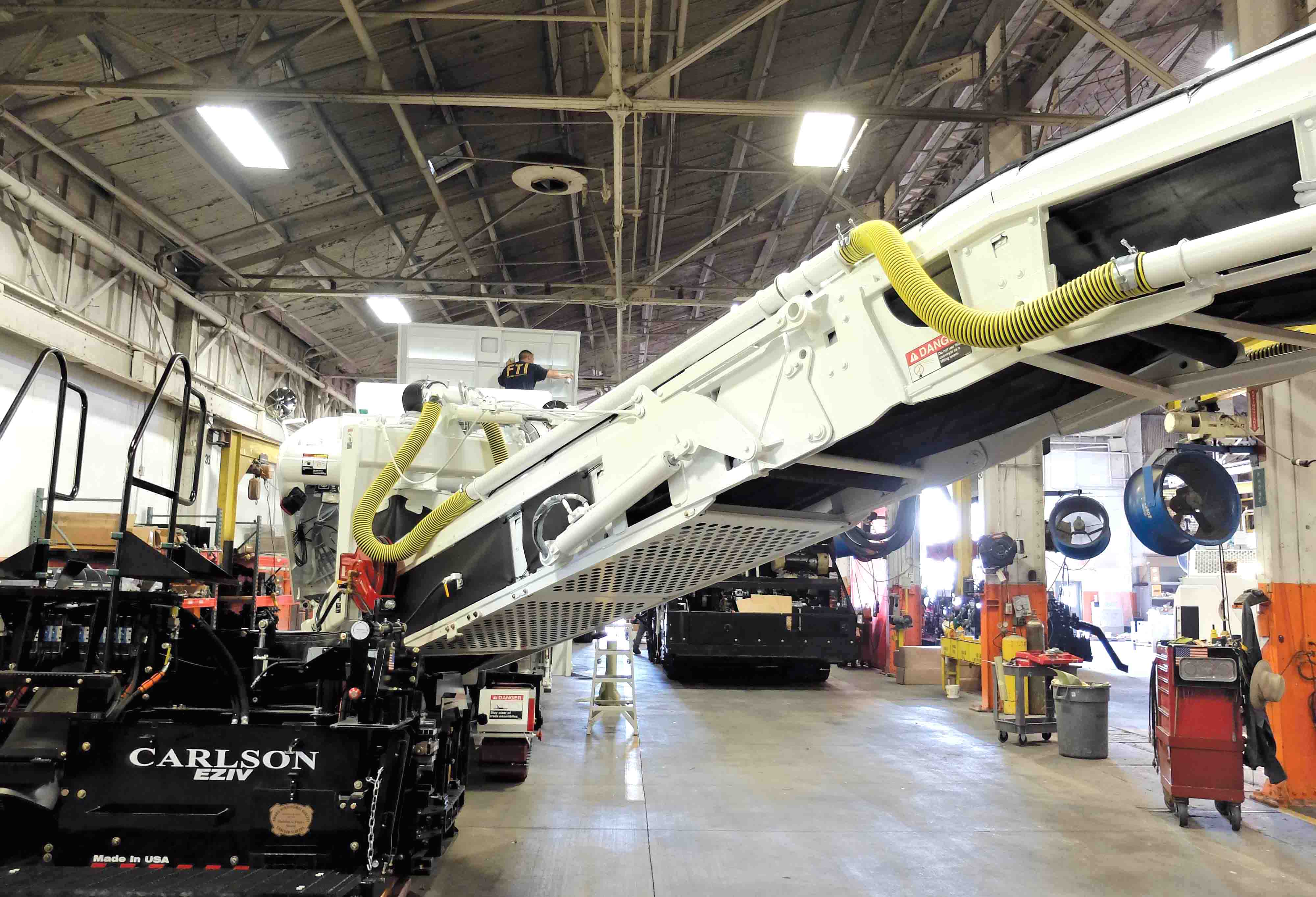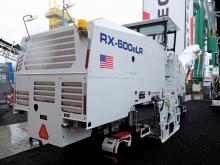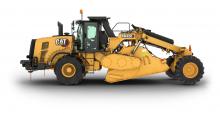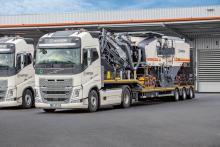Major manufacturers are introducing new machines for road milling and recycling that will boost output and lower the cost/m - Mike Woof writes
New machines for milling and road recycling will offer increased performance and productivity than earlier generation equipment. Higher quality cutting will help contractors achieve smoother surfaces and considerably lower paving costs also. Meanwhile new recycler/stabiliser machines will offer a better cost/m and improve the economics of road recycling for contra

Roadtec has invested heavily in its milling machine and stabiliser range, as well as upgrading its production facility
Major manufacturers are introducing new machines for road milling and recycling that will boost output and lower the cost/m - Mike Woof writes
New machines for milling and road recycling will offer increased performance and productivity than earlier generation equipment. Higher quality cutting will help contractors achieve smoother surfaces and considerably lower paving costs also. Meanwhile new recycler/stabiliser machines will offer a better cost/m and improve the economics of road recycling for contractors and clients.
German firm172 BOMAG has updated its milling machine line and now offers a range topped by the BM2000/75 and BM2200/75, aimed at the 2m and 2.2m markets respectively. Both machines feature 560kW diesels, which the firm claims makes these the most powerful mills in their class.
Meanwhile BOMAG’s RS500 recycler/ stabiliser has been a key introduction for the firm and offers a high degree of versatility. The 25tonne machine is just 2.55m wide, which makes transporting it by road easier, while the cab can also be lowered to reduce its overhead clearance when being moved from site to site. Power comes from a 373kW Mercedes diesel, with a Tier 4 Final/Stage IV compliant version available for North America and Europe. A novel feature is the new cooling pack design, which has the airflow running from top to the front and is designed to improve cooling while also minimising the risk of dust contamination in the engine compartment.
It offers a high degree of versatility compared to earlier generation units and a spokesperson for the firm said, “You can run the machine backwards because the operator seat turns through 180°. The rear of the machine is lighter so if the ground is soft you can reverse in with the lighter end and then drive forwards again for the final pass.”
A novel feature is the movable rotor box that provides 300mm of side-shift to both the left and right of the machine. This allows the unit to operate close to walls as well as allowing the rotor to be manoeuvred around obstructions in the machine’s path. Another benefit of this system is that it means recycling work can be carried out where the ground is unstable, as the machine’s weight can remain on firmer terrain. Cross-slope correction is also available for the machine, which is offered with BOMAG’s own tooling system that has been designed for long wear life as well as ease of change-outs.
178 Caterpillar’s milling machine range meanwhile has seen a major development with the introduction of the PM620 and PM622 models and further developments are planned for this line-up. The PM620 and PM622 share many design features such as the Cat C18 470kW diesel, and are aimed at the 2m and 2.2m class respectively. This is a key class as it represents some 35-40% of the overall market for milling machines. Other common features include three cutting speeds while the machine has an automatic load control function that optimises performance during operation.
The new mills use similar controls to Caterpillar’s latest F-Series pavers, with touchscreens, as well as sophisticated electronics and other systems also being shared with the pavers. The machines can use the new Cat Grade Control systems for accurate working, offering customers the option of 2D or 3D packages. In addition, an automatic plunge cut system is said to ease the rotor into the start of the cut while a cross communication function allows the operator to view and change control box settings.
A cross-coupling system meanwhile ensures that when an adjustment is made to the grade or slope of one side of the machine, the opposite side will similarly adjust based on command parameters.
The firm is also keen to further develop the market for its diamond cutting tools for milling. While the cutters are significantly more costly than conventional tungsten carbide units and offer broadly the same cost overall in terms of purchase cost/m cut, these offer benefits in the long term. Because the diamond cutters stay sharp for longer, they offer better surface smoothness while also reducing downtime for change-outs as they last longer, the diamond cutters also offer additional advantages too. With more efficient cutting, they help to reduce wear and tear on the milling machines and cut servicing requirements, further reducing overall running costs. They reduce the stresses exerted on the machine drivetrain and lower vibration levels, which even makes the mills less noisy and less tiring to operate.
However, using the diamond cutting tools does require efficient planning and these tools best suit use on highway jobs, where there are no metal access covers or steel joints in the roadway. Caterpillar’s Jon Sjolbad explained “You’ve got to know what you’re milling. It’s not a technology for everyone.”
1252 Roadtec has been continuing to invest in its RX series milling machine range, with new developments in the manufacturing plant as well as an almost continuous flow of updates to the units themselves. In the factory a new robotic welder has been introduced for the milling machine and stabiliser drums, one of several recent updates to the plant. Meanwhile the machines have been upgraded with the option of new Tier 4 Final compliant diesels. Roadtec’s RX900 planer can be used to mill widths up to 3.8m wide, although the machine will normally be used for milling widths of 2.2m. Power comes from a diesel delivering 708kW. The smaller RX600 is a 2m class mill and is offered both as a three-track machine as well as in the four-track configuration. The three-track variant offers more manoeuvrability and is also lighter at 27.7tonnes, making it easier to transport while the 29tonne four-track version offers better traction for heavy-duty milling.
Although the three-track configuration was originally offered as an option; this has been highly successful with customers and is now the better selling of the two variants, according to the firm. A special variant will be the RX- 600eLR, which features a narrow design, hydrostatic drive to the cutter and a drum that overhangs the chassis and allows it to mill flush to a kerb or highway barrier.
The new Guardian telematics package is fitted as standard to the new mills. Marketing manager Eric Baker said, “It can be used with the customer no matter where they area.”
The system allows the customer to optimise operations by focussing on diagnostics and allowing greater uptime. The system can be used for production reporting purposes for fleet management also.
Baker said, “It’s changing the world of equipment. People want data.” He added that there are challenges as to what data goes where as owners, estimators and workshop managers for example all require different information. With this in mind, the firm has been working on filtering the information so that each person in each role can receive what they require, rather than every piece of data the machine can deliver as this makes utilisation more efficient. He continued, “We started with the diagnostics side of the machines and then expanded it to servicing but now we’re looking at overseeing all aspects of the machines. We can actually view the grade and slope controls and view the pressure settings. It’s a two-way system and we can make corrections from Chattanooga.”
He explained that this facilitates the use of electronic data from the machines by the contractor, eliminating the need for paper tickets for example. Meanwhile because the machines are being monitored continuously, productivity can increase by as much as 12%.
Meanwhile by watching what is being milled from the road surface, a contractor has a far better idea of what quantity of material will have to be laid afterwards.
The milling machines are also available with the firm’s latest ACE package, which offers automated elevation using a combination of grade and slope sensors, boosting the quality of work being carried out. Other new updates that further boost working versatility and safety include the option of folding secondary conveyors to aid in transport and loading, as well as more effective dust extraction systems.
New machines for milling and road recycling will offer increased performance and productivity than earlier generation equipment. Higher quality cutting will help contractors achieve smoother surfaces and considerably lower paving costs also. Meanwhile new recycler/stabiliser machines will offer a better cost/m and improve the economics of road recycling for contractors and clients.
German firm
Meanwhile BOMAG’s RS500 recycler/ stabiliser has been a key introduction for the firm and offers a high degree of versatility. The 25tonne machine is just 2.55m wide, which makes transporting it by road easier, while the cab can also be lowered to reduce its overhead clearance when being moved from site to site. Power comes from a 373kW Mercedes diesel, with a Tier 4 Final/Stage IV compliant version available for North America and Europe. A novel feature is the new cooling pack design, which has the airflow running from top to the front and is designed to improve cooling while also minimising the risk of dust contamination in the engine compartment.
It offers a high degree of versatility compared to earlier generation units and a spokesperson for the firm said, “You can run the machine backwards because the operator seat turns through 180°. The rear of the machine is lighter so if the ground is soft you can reverse in with the lighter end and then drive forwards again for the final pass.”
A novel feature is the movable rotor box that provides 300mm of side-shift to both the left and right of the machine. This allows the unit to operate close to walls as well as allowing the rotor to be manoeuvred around obstructions in the machine’s path. Another benefit of this system is that it means recycling work can be carried out where the ground is unstable, as the machine’s weight can remain on firmer terrain. Cross-slope correction is also available for the machine, which is offered with BOMAG’s own tooling system that has been designed for long wear life as well as ease of change-outs.
The new mills use similar controls to Caterpillar’s latest F-Series pavers, with touchscreens, as well as sophisticated electronics and other systems also being shared with the pavers. The machines can use the new Cat Grade Control systems for accurate working, offering customers the option of 2D or 3D packages. In addition, an automatic plunge cut system is said to ease the rotor into the start of the cut while a cross communication function allows the operator to view and change control box settings.
A cross-coupling system meanwhile ensures that when an adjustment is made to the grade or slope of one side of the machine, the opposite side will similarly adjust based on command parameters.
The firm is also keen to further develop the market for its diamond cutting tools for milling. While the cutters are significantly more costly than conventional tungsten carbide units and offer broadly the same cost overall in terms of purchase cost/m cut, these offer benefits in the long term. Because the diamond cutters stay sharp for longer, they offer better surface smoothness while also reducing downtime for change-outs as they last longer, the diamond cutters also offer additional advantages too. With more efficient cutting, they help to reduce wear and tear on the milling machines and cut servicing requirements, further reducing overall running costs. They reduce the stresses exerted on the machine drivetrain and lower vibration levels, which even makes the mills less noisy and less tiring to operate.
However, using the diamond cutting tools does require efficient planning and these tools best suit use on highway jobs, where there are no metal access covers or steel joints in the roadway. Caterpillar’s Jon Sjolbad explained “You’ve got to know what you’re milling. It’s not a technology for everyone.”
Although the three-track configuration was originally offered as an option; this has been highly successful with customers and is now the better selling of the two variants, according to the firm. A special variant will be the RX- 600eLR, which features a narrow design, hydrostatic drive to the cutter and a drum that overhangs the chassis and allows it to mill flush to a kerb or highway barrier.
The new Guardian telematics package is fitted as standard to the new mills. Marketing manager Eric Baker said, “It can be used with the customer no matter where they area.”
The system allows the customer to optimise operations by focussing on diagnostics and allowing greater uptime. The system can be used for production reporting purposes for fleet management also.
Baker said, “It’s changing the world of equipment. People want data.” He added that there are challenges as to what data goes where as owners, estimators and workshop managers for example all require different information. With this in mind, the firm has been working on filtering the information so that each person in each role can receive what they require, rather than every piece of data the machine can deliver as this makes utilisation more efficient. He continued, “We started with the diagnostics side of the machines and then expanded it to servicing but now we’re looking at overseeing all aspects of the machines. We can actually view the grade and slope controls and view the pressure settings. It’s a two-way system and we can make corrections from Chattanooga.”
He explained that this facilitates the use of electronic data from the machines by the contractor, eliminating the need for paper tickets for example. Meanwhile because the machines are being monitored continuously, productivity can increase by as much as 12%.
Meanwhile by watching what is being milled from the road surface, a contractor has a far better idea of what quantity of material will have to be laid afterwards.
The milling machines are also available with the firm’s latest ACE package, which offers automated elevation using a combination of grade and slope sensors, boosting the quality of work being carried out. Other new updates that further boost working versatility and safety include the option of folding secondary conveyors to aid in transport and loading, as well as more effective dust extraction systems.







